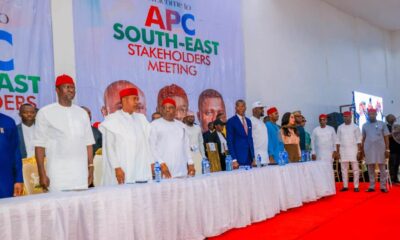GRBusiness
Beijing style economic governance will not work for Africa, Okonjo-Iweala warns


China has funnelled billions of dollars into aid, loans and business deals on the African continent in recent years.
But as ties continue to strengthen, former Minister of Finance Ngozi Okonjo-Iweala has warned that Beijing-style economic governance will not work for Africa.
“China has been very helpful,” particularly with building much-needed infrastructure in Africa, the two-time former finance minister told CNBC recently.
But while less economically advanced countries may wish to emulate China’s economic success, the Chinese approach of state-led development would prove unsuccessful for the majority of Africa, she said.
“In most African countries, it has been shown that state-led growth — pure state-led growth — has really not worked,” Okonjo-Iweala said, citing the example of Nigeria’s “vibrant private sector”.
In her view, the Nigerian government, through state-owned enterprises, has not shown itself capable of managing its manufacturing and heavier industries, for example.
Corruption could result from increased government intervention in business, Okonjo-Iweala said. “Some of our governments, when they get into the direct provision of jobs and services — that’s where corruption creeps in because it’s not well-handled, the institutions of state are not strong enough, the checks and balances are not strong.”
Okonjo-Iweala served as Nigeria’s finance minister twice, from 2003-2006 and most recently during 2011-2015 under previous President Goodluck Jonathan. She is a former director at the World Bank and is currently an adviser at the Asian Infrastructure Development Bank.
Nonetheless, one African country known for its economic partnership with China is Ethiopia. Infrastructure, as well as industrial parks to boost the manufacturing sector, have been built as part of Beijing’s Belt and Road Initiative, a multi-billion dollar spending plan to resurrect ancient trading routes centred on China.
Ethiopia, an East African country that has seen double-digit gross domestic product (GDP) growth as recently as 2017, has echoed China’s state-led development style.
“This approach will only work in countries where the power is highly centralised,” Anna Rosenberg, research director at emerging market advisory firm Frontier Strategy Group, told CNBC. Besides Ethiopia, she cited Mozambique and Rwanda as suitable examples.
Nigeria’s entrepreneurial society is less conducive to China-style economic management, she said.
History could also play a role, Rosenberg suggested. While Cold War allegiances to the Soviet Union may be present in some African countries, Nigeria, by contrast, is a former British colony and therefore more espoused to a free market system.
“I think China sees Africa as a strategic continent that it wants to be a partner with,” Okonjo-Iweala said. “Africa does have the natural resources that China lacks in many ways.”
But she added that in her view, this partnership extends beyond pure economic deals. “I believe strongly there is overarching political and soft power that is involved.”
For Okonjo-Iweala, it is important to demonstrate the fruits of African business deals with China to the public. She described Beijing-funded new airport terminals in the Nigerian capital, Abuja, as an example of this because “people will be able to see them, and witness them, and know that the money went into something concrete”.
Last week, China’s state-run news agency Xinhua reported that Nigeria had signed a deal with the China Civil Engineering Construction Corporation to build a railway from its economic hub Lagos to Kano, a commercial hotspot in the north of the country.
African countries must enter business deals with China “with our eyes open,” Okonjo-Iweala said, to capitalise on its manufacturing expertise and technological development.
Africa is in the process of expanding its manufacturing sector in an attempt to bolster economic development. Nigeria, as part of an attempt to wean itself off oil dependence, has grown its manufacturing base from just 2.5 per cent of value added to GDP in 2009 to 8.8 per cent in 2016, according to the World Bank.
But with regards to regulating Africa-China business deals, “we are absolutely not there,” Okonjo-Iweala said, although she added that this is varied among African countries. Providing that fair and transparent agreements are drawn up, “we can work with China – why not?”
Credit: CNBC










